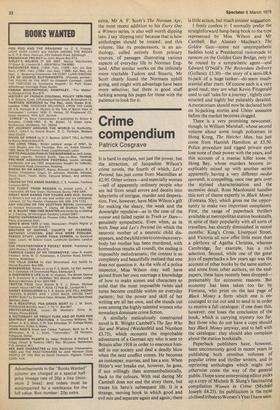Crime compendium
Patrick Cosg rave It is hard to explain, not just the power, but the attraction, of Jacqueline Wilson's crime novels, the fourth of which, Let's Pretend, has just come from Macmillan at £2.95. Other writers—and especially women —tell of apparently ordinary people who are led from small errors and deceits into labyrinths of intrigue, murder and desperation. Few, however, have Miss Wilson's gift for making the sleazy, the weak and the downright repulsive—as in the case of the voyeur and failed rapist in Truth or Dare— genuinely sympathetic. Even when, as in both Snap and Let's Pretend (in which the neurotic mother of a neurotic child disappears, and the child tries to convince everybody her mother has been murdered, with horrendous results all round), the ending is impossibly melodramatic, the context is so completely and beautifully realised that one does not question it. As the wife of a police inspector, Miss Wilson may well have gained from her own marriage a knowledge of how to make scenes and characters so solid that the most impossible twists and turns become credible within an everyday pattern; but the power and skill of her writing are all her own, and she stands out even among the highly talented women who nowadays dominate crime fiction.
A similarly meticulously constructed novel is R. Wright Cambell's The Spy Who Sat and Waited (Weidenfeld and Nicolson £3.75), which recounts the improbable adventures of a German spy who is sent to Britain after 1918 in order to ensconce himself in our society and deal a deadly blow when the next conflict comes. He becomes an innkeeper, marries, and has a son. When Hitler's war breaks out, however, he goes, if not willingly then somnambulistically, back to the colours. With real daring Mr Cambell does not end the story there, but traces his hero's subsequent life. It is a strange, moving book in which good and evil mix and separate again and again; there is little action, but much sinister sugiostion.
I freely confess it : I normally prefer the straightforward bang-bang book to the type represented by Miss Wilson and Mr Cambell. But Alastair Maclean's The Golden Gate—some not unsympathetic baddies hold a Presidential motorcade to ransom on the Golden Gate Bridge, only to be routed by a sympathetic agent—and Edward O'Neill's The Rotterdam Delivery (Gollancz £3.30)—the story of a semi-IRA hi-jack of a huge tanker—do seem insubstantial after them. Of course each is a very good read; they are what Kevin Fitzgerald used to call `tales for a journey', tightly constructed and highly but palatably detailed. A moratorium should now be declared both on hi-jacking stories and Ulster assassins before the market becomes clogged.
There is a very promising newcomer, though, in William Marshall, whose second volume about some tough policemen in Hong Kong, The Hatchet Man, has just come from Hamish Hamilton at £3.50. Police procedure and rigged private eyes lose none of their power with the years, and this account of a maniac killer loose in Hong Bay, whose murders become inexplicably mixed up with another series apparently having a very different modus operandi, is compelling, once one gets over. the stylised characterisation and the excessive detail. Ross Macdonald handles this sort of theme expertly in Black Money (Fontana 50p), which gives me the opportunity to make two important complaints. First, the range of paperback thrillers available at metropolitan station bookstalls, in spite of their popularity with all sorts of travellers, has sharply diminished in recent months: King's Cross, Liverpool Street, and Victoria all now offer little more than a plethora of Agatha Christies, whereas Cambridge, for example, has a rich selection. Second, while one of the great joys of paperbacks a few years ago was the account of other books by the same author, and some from other authors, on the endpapers, these have recently been dropped— presumably for economic reasons. But economy has been taken too far by Fontana, who print on the last page of Black Money a form which one is encouraged to cut out and to send in in order to receive a full catalogue: if one does this, however, one loses the conclusion of the book, which is carrying mystery too far. But those who do not have a copy should buy Black Money anyway, and to hell with the catalogue: they should also complain about the station bookstalls.
Paperback publishers have, however, been uncommonly good in recent years in publishing both omnibus volumes of popular crime and thriller writers, and in reprinting anthologies which might not otherwise come the way of the general public. I hope some enterprising editor picks up a copy of Michele B. Slung's fascinating compilation Women in Crime (Michael Joseph £4.25). Its publication is the most civilised tribute to Women's Year I have seen.


































 Previous page
Previous page